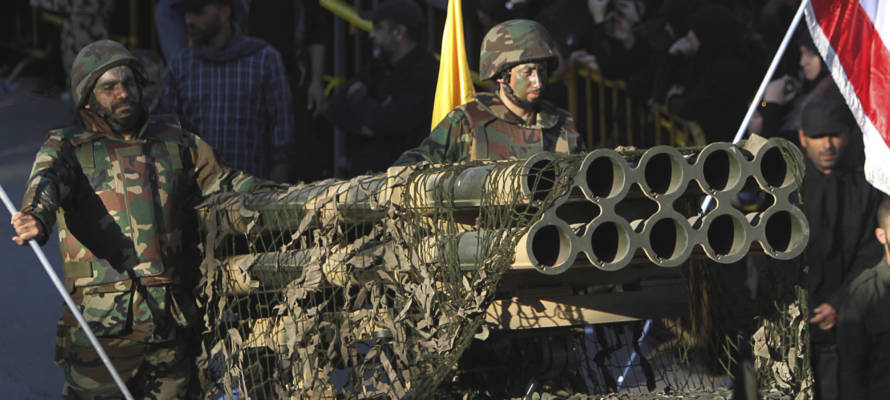It is unclear whether Khraisheh was claiming that another major attack would occur on Oct. 7 or more generally that another onslaught against the Jewish state was coming.
A senior Palestinian official has boasted that Israel will soon suffer another large-scale massacre similar to the Palestinian terror group Hamas’s Oct. 7 attacks on southern Israel — except this time the onslaught will come from southern Lebanon rather than Gaza.
The warning from Hassan Khraisheh — deputy speaker of the Palestinian Legislative Council, the legislature of the Palestinian Authority (PA) — came as tensions continued to skyrocket between Israel and Hezbollah, the powerful terrorist organization based in Lebanon.
“We are living a new Oct. 7, but this time it is not in Gaza, but rather in the north of occupied Palestine, starting from southern Lebanon,” Khraisheh told Quds Press, according to a translation of his comments.
The Islamic Republic News Agency, the official news agency of Iran, also reported on Khraisheh’s comments and translated them a bit differently: “On Oct. 7, we will experience a new one, but this time, not in Gaza, but in the north of occupied Palestine and south of Lebanon.”
Both Hamas and Hezbollah are backed by Iran, which provides the Islamist terror groups with weapons, funding, and training.
It is unclear whether Khraisheh was claiming that another major attack would occur on Oct. 7 or more generally that another onslaught against the Jewish state was coming.
Thousands of Hamas-led Palestinian terrorists invaded southern Israel from neighboring Gaza on Oct. 7 of last year, murdering 1,200 people, injuring thousands more, and kidnapping over 250 hostages.
The terrorists perpetrated rampant sexual violence, including torture and gang-rape, against the Israeli people during the attack, the largest single-day massacre of Jews since the Holocaust.
Israel responded with an ongoing military campaign in Hamas-ruled Gaza aimed at freeing the hostages and dismantling Hamas’s military and governing capabilities.
Hamas leaders have vowed to carry out attacks against Israel similar to the Oct. 7 invasion “again and again.”
In recent months, however, as Israel has imposed devastating losses on Hamas in Gaza to the south, it has increasingly turned more of its attention northward to Hezbollah in Lebanon.
Hezbollah has fired barrages of rockets, missiles, and drones at northern Israel almost daily following the Oct. 7 attacks by Hamas. Since then, both sides have been exchanging fire constantly while avoiding a major escalation as war rages in Gaza.
More than 60,000 Israelis have been forced to evacuate their homes in northern Israel and flee to other parts of the country amid the unrelenting attacks from Hezbollah, which wields significant political and military influence across Lebanon.
Israeli leaders have said they seek a diplomatic resolution to the conflict with Hezbollah along the border with Lebanon but are prepared to use large-scale military force if needed to ensure all citizens can safely return to their homes.
Last week, Israel’s security cabinet expanded its war goals to include returning the displaced Israelis from the north.
On Monday morning, Israeli fighter jets conducted massive airstrikes on Hezbollah targets across Lebanon to prevent the Iranian-backed terror army from firing rockets across the border.
The strikes came after Hezbollah launched more than 100 rockets and drones at northern Israel in waves of attacks overnight on Saturday and Sunday morning.
The Hezbollah barrage was in response to the thousands of pagers and walke-talkies used by Hezbollah terrorists that exploded in Lebanon last week.
While Israel neither confirmed nor denied responsibility for the sophisticated operation, Iran and Hezbollah blamed the Jewish state and vowed revenge. Several experts and media reports said Israeli intelligence was behind the blasts.
According to Khraisheh, the Hezbollah strikes were a sign that Iran’s so-called “axis of resistance” of terrorist proxies across the Middle East was in a winning position.
“[It was] a response that confirms beyond any doubt that the axis of resistance is still strong,” he said. “Those fighting with Palestine are our brothers in Yemen, Iraq, and Lebanon, and this expresses the unity of the arenas that confuse the occupation [Israel].”
Iran-backed militias in Iraq and Yemen’s Houthi terrorist group, which is also supported by Tehran, have all expressed support for Hamas and Hezbollah and in some cases launched attacks against Israel.
Khraisheh also claimed that Israel was “deepening its occupation” of Judea and Samaria, urging all Palestinians to be united in opposing the Jewish state. The PA, which exercises limited self-governance over Judea and Samaria, is a rival of Hamas.
Still, PA officials have been regularly rationalizing Hamas’s Oct. 7 massacre across southern Israel and in some cases even denying it took place or falsely claiming Israeli forces carried out the onslaught.
